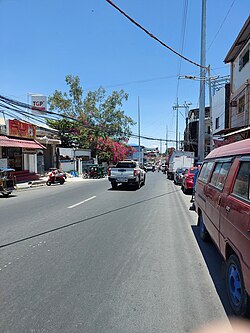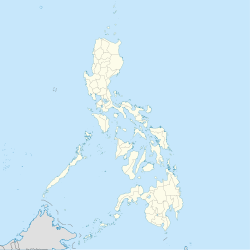Maharlika Village, officially Barangay Maharlika and simply known as Maharlika, is one of the 38 barangays of Taguig, Metro Manila, Philippines. As of the 2020 census, the population was 23,470. The barangay, which was created from the land that was excluded out of AFP Enlisted Men's Village on January 3, 1974, has the largest Muslim community in Metro Manila.[4][5]
Maharlika Village
Maharlika | |
|---|---|
 Mindanao Avenue | |
 Map of Maharlika Village | |
Location of Maharlika Village within Metro Manila Location of Maharlika Village within Luzon | |
| Coordinates: 14°29′50.48″N 121°3′19.95″E / 14.4973556°N 121.0555417°E | |
| Country | Philippines |
| Region | Metro Manila |
| City | Taguig |
| District | District 2 |
| Created | January 3, 1974 |
| Government | |
| • Type | Sangguniang Barangay |
| • Barangay Captain | Hareem P. Pautin |
| • Barangay Councilor |
|
| • Sangguniang Kabataan Chairperson | Amir C. Masbud |
| Area | |
• Total | 54 ha (133 acres) |
| Population (2020)[2] | |
• Total | 23,470 |
| Time zone | UTC+08:00 |
| Area code | 02[3] |
History
editSince the 1950s, a Muslim community consisting of few Moro families led by an imam named Muhammad Kusin had existed in a military reservation area for the Armed Forces of the Philippines in Taguig.[4] They later petitioned to then-President Diosdado Macapagal to allocate five hectares of land in that area where they could establish a settlement, but Macapagal rejected their request.[5] Since 1964, around 20 families had illegally build huts made of lawanit in the area.[5]
Then-President Ferdinand Marcos signed Proclamation No. 1217 on January 3, 1974, which would detach a portion of AFP Enlisted Men's (EM's) Village, totaling 305,000 square meters (30.5 hectares), to become a subdivision for the Muslim settlers known as Maharlika Village.[6] Its name was based on maharlika, which means "royalty or of noble origin".[5] Two new sitios were created for the increasing number of settlers, namely Imelda Romualdez Marcos (named after then-First Lady Imelda Marcos) and Bandara-Ingued.[5] Eventually, the three areas were grouped under one barangay, which was also named Maharlika Village.[5]
Geography
editMaharlika Village has a total land area of 54 hectares (540,000 square meters).[5] The barangay is traversed by the West Valley Fault of the Marikina Valley Fault System.[7]
Demographics
edit| Year | Population | ±% |
|---|---|---|
| 1975 | 121 | — |
| 1980 | 811 | +570.2% |
| 1985* | — | — |
| 1990 | 2,974 | — |
| 1995 | 11,268 | +278.9% |
| 2000 | 12,857 | +14.1% |
| 2007** | 16,474 | +28.1% |
| 2010 | 17,781 | +7.9% |
| 2015 | 22,944 | +29.0% |
| 2020 | 23,470 | +2.3% |
| * No census was held in 1985 due to a political and economic crisis ** Census was delayed from the original 2005 due to the reenacted budget that lasted until 2006 Source: National Census and Statistics Office (1975,[8] 1980,[9] and 1990[10] census), National Statistics Office (1995,[11] 2000,[12] 2007,[13] and 2010[14] census), and Philippine Statistics Authority (2015 and 2020 census)[2] | ||
As of the 2020 Philippine census, there were 23,470 residents of Maharlika Village.[2]
Government
editErlinda Pangandaman served as a barangay captain (Filipino: kapitan ng barangay) of Maharlika Village from 1994 to 2007.[15] Erlinda was succeeded by Yasser Pangandaman, who served from 2007 to 2013.[16][17] Yasser ran again in the 2013 barangay elections unopposed, resulting in him securing another term.[17] Baisittee Pangandaman replaced him as the barangay captain when he ran in the 2016 local elections and won as the city councilor for the second district.[18][19] Baisittee served until 2018 and sought reelection in the barangay elections that year, but she was defeated by her nephew Hareem Pangandaman Pautin.[18] Hareem eventually got reelected in the next barangay elections in 2023.[1] That year, Hadji Akmad Dianalan Wahab, Jamal Pangandaman Macaalin, Khalid Abo Hasim, Camal Manan Usman, Abdulfahad Mangondato Musa, Hadji Esmael Ampatua Sarip, and Hayme Menor Ditano were also elected as barangay councilors (Filipino: mga kagawad ng barangay), as well as Amir Canoy Masbud as the chairperson of Sangguniang Kabataan.[1]
Education
editMaharlika Village encompasses Maharlika Village Islamic Madrasah and Maharlika Integrated School. Maharlika Village Islamic Madrasah is a madrasah that is accredited by the Department of Education to offer preschool, elementary, and secondary education.[20] It was founded by the Maharlika Village Islamic Foundation on December 15, 1983.[20][21] Maharlika Integrated School, which began operations in 2000, was previously an annex school of Silangan Elementary School in Upper Bicutan, until it was renamed as Maharlika Elementary School on September 17, 2009, before changing again to its latest name.[22]
Informatica Technology Center was a vocational school that was accredited by the Technical Education and Skills Development Authority to offer computer-related courses. It began its construction in February 2002 and was inaugurated in February 2003.[23]
Landmarks
editMaharlika Village is known for its blue-themed mosque called the Blue Mosque.[24] The barangay also has a cemetery for Muslims called the Imam Moh Kusin Memorial Park.[25]
References
edit- ^ a b c Hicap, Jonathan (November 8, 2023). "Comelec releases list of winners in barangay, SK elections in Taguig". Manila Bulletin. Archived from the original on June 8, 2024. Retrieved July 3, 2024.
- ^ a b c "2020 Census of Population and Housing" (PDF). Philippine Statistics Authority. p. 70. Archived (PDF) from the original on April 9, 2024. Retrieved July 3, 2024.
- ^ "8-digit landline numbers in NCR to start in October". Philippine News Agency. July 24, 2019. Archived from the original on June 10, 2024. Retrieved July 3, 2024.
- ^ a b Romualdez-Valtos, Eliza (December 30, 2023). "All that glitters is not gold—they can be ceramic". Manila Bulletin. Archived from the original on July 3, 2024. Retrieved July 3, 2024.
- ^ a b c d e f g Go, Miriam Grace (March 3, 2013). "A royal past eroding". Rappler. Archived from the original on March 6, 2013. Retrieved July 3, 2024.
- ^ Presidential Proclamation No. 1217 (January 3, 1974), Excluding from the Operation of Proclamation No. 462, Dated September 29, 1965, Which Established the AFP Enlisted Men's Village Situated in the Municipality of Taguig, Province of Rizal, Island of Luzon, A Certain Portion of the Land Embraced Therein, and Declaring the Same as Maharlika Village To Be Disposed of Under the Provisions of Act No. 3038, in Relation to the Public Land Act (C.A. No. 141, as Amended) and Republic Act No. 274., archived from the original on July 3, 2024, retrieved July 3, 2024
- ^ Zafra, Tricia (May 18, 2015). "LIST: Barangays in Metro Manila, nearby provinces near earthquake fault". GMA News Online. Archived from the original on June 27, 2024. Retrieved July 3, 2024.
- ^ "1975 Integrated Census of the Population and Its Economic Activities – Population Rizal" (PDF). Philippine Statistics Authority. p. 13. Archived from the original (PDF) on June 12, 2024. Retrieved July 3, 2024.
- ^ "1980 Population Count" (PDF). Philippine Statistics Authority. p. 51. Archived from the original (PDF) on June 27, 2023. Retrieved July 3, 2024.
- ^ "1990 Census of Population and Housing" (PDF). Philippine Statistics Authority. Archived (PDF) from the original on June 12, 2024. Retrieved July 3, 2024.
- ^ "Population Census". National Statistics Office. Archived from the original on February 11, 1998. Retrieved July 3, 2024.
- ^ "Census 2000". National Statistics Office. Archived from the original on April 5, 2002. Retrieved July 3, 2024.
- ^ "2007 Census of Population". National Statistics Office. Archived from the original on February 9, 2010. Retrieved July 3, 2024.
- ^ "2010 Census of Population and Housing" (PDF). Philippine Statistics Authority. p. 49. Archived (PDF) from the original on April 10, 2024. Retrieved July 3, 2024.
- ^ "Rest in Peace: Erlinda G. Pangandaman". I Love Taguig. August 17, 2022. Archived from the original on July 3, 2024. Retrieved July 3, 2024 – via Facebook.
- ^ "Brgy. Maharlika Village". taguig.gov.ph (in Filipino). Archived from the original on April 21, 2009. Retrieved July 3, 2024.
- ^ a b Sabillo, Kristine Angeli (October 28, 2013). "At last, polls in Maharlika village in Taguig end 'clean and uneventful'". Inquirer.net. Archived from the original on July 3, 2024. Retrieved July 3, 2024.
- ^ a b Cabalza, Dexter (May 17, 2018). "Nephew unseats aunt in close, violence-marred Taguig polls". Inquirer.net. Archived from the original on July 3, 2024. Retrieved July 3, 2024.
- ^ "Halalan 2016 – Partial and Unofficial Results – Taguig City, NCR". ABS-CBN. Archived from the original on July 3, 2024. Retrieved July 3, 2024.
- ^ a b "School Brochure". Maharlika Village Islamic Madrasah. June 5, 2011. Archived from the original on July 5, 2024. Retrieved July 5, 2024 – via Blogger.
- ^ "Tapestry". Maharlika Village Islamic Foundation. July 17, 2011. Archived from the original on July 5, 2024. Retrieved July 5, 2024 – via Blogger.
- ^ "Maharlika (MES-to-MIS) Integrated School". Archived from the original on July 3, 2024. Retrieved July 3, 2024 – via Google Sites.
- ^ "A dream come true". Maharlika Village Islamic Foundation. July 17, 2011. Archived from the original on July 5, 2024. Retrieved July 5, 2024 – via Blogger.
- ^ "A symbol of faith". Inquirer.net. September 2, 2017. Archived from the original on July 5, 2024. Retrieved July 5, 2024.
- ^ Hicap, Jonathan (October 23, 2023). "Taguig LGU releases guidelines for Undas 2023". Manila Bulletin. Archived from the original on July 4, 2024.


